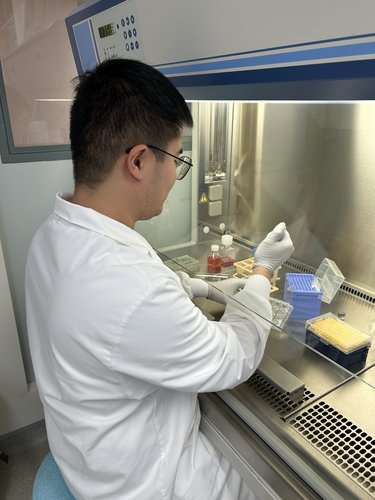The impact of microbial-derived metabolites on gut function in weaned piglets
By Shaila Ann Sigsgaard
In this video, PhD student Li Hsuan Chen from Aarhus University, Department of Animal and Veterinary Sciences, provides a glimpse into his research project within PIG-PARADIGM under the Nutrition Pillar. He discusses "The impact of microbial-derived metabolites on gut function in weaned piglets under different levels of dietary protein and a surplus of dietary amino acids." The research aims to improve pig gut health and address diarrhea in weanling piglets.
Li Hsuan Chen investigates the impact of dietary protein levels and amino acid supplementation on pig gut health, focusing specifically on the metabolite compositions of the digesta samples from the ileum, colon, and cecum. In this trial, he studies the impact of different dietary protein levels on diarrhea risk by calculating the fecal dry matter. Also, he collects the digesta samples from ileum, cecum, and colon for untargeted metabolomics to investigate metabolite composition and its correlation with the diarrhea risk piglets
During sample preparation for LC-MS, small molecules are extracted from samples while large molecules like proteins are removed through a protein precipitation. After filtration, the samples are ready for the next step, LC-MS analysis which is used to perform untargeted metabolomics analysis. After the LC-MS machine running, raw spectra are extracted and further processed for data analysis and compound identification to determine the composition of metabolites and their differences following treatment.
The aim of the study is to elucidate the interaction between the host and microbial-derived metabolites in the gut. The hope is to find the metabolites candidates responsible for harmful effects on the gut health correlating to the risk of diarrhea in piglets as well as potential beneficial metabolites that can repair and stimulate gut function in piglets. The characteristics of these compounds will be further tested on the in vitro system using both on cell lines and organoids.
What is LC-MS?
Liquid Chromatography-Mass Spectrometry (LC-MS) is a method used to separate compounds in a sample based on their affinity to other molecules, paired with mass spectrometry (MS) for further analysis. LC-MS combines these two techniques into one superior method. Liquid chromatography is excellent for separating larger and non-volatile molecules like proteins and complex peptides. Combining this with mass spectrometry allows for broad sample coverage using different column chemistries.
Exploring PIG-PARADIGM with Li Hsuan Chen
Li-Hsuan Chen
PhD student
Department of Animal and Veterinary Sciences
Aarhus University
Research Topic: The impact of microbial-derived metabolites on gut function in weaned piglets under different levels of dietary protein and a surplus of dietary amino acids
Email: lihsuan.chen@anivet.au.dk

